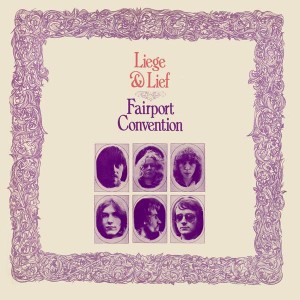 I’ve said it before: 1969 was a very good year.
I’ve said it before: 1969 was a very good year.
No, seriously. From the end of 1968 until the Altamont fiasco in December 1969, I had more music than most people get in their lifetimes. It was nuts, in the best possible way: the Dead, the Airplane, MC5, Hendrix, the Doors, the Stones, Jeff Beck, Led Zeppelin…oh, and the little party in upstate New York that August. A stellar year, and I was drenched in it. I got emotionally naked and rolled around in it. Piano, bass, drums, monster guitarists for light years. Good stuff.
The guitarists weren’t all hard rockers, though. 1969 saw the release of two albums that gave me a case of musical whiplash: Pentangle’s Basket of Light and Fairport Convention’s Liege & Lief. (If memory serves, the third leg in that triad of bands, Steeleye Span, was still a year away from formation.)
Pentangle has their own story. They have one of the purest voices in English music, in Jacqui McShee; they also have two of the best guitarists on earth, and if anyone wants to roll their eyes and claim that either John Renbourn or Bert Jansch isn’t all that, don’t waste your time or mine.
As much as I love Basket of Light, it was the other album that actually managed to pull my attention away from Hendrix and Beck and Page. I discovered Fairport Convention courtesy of my father, who came home one day and said, here, listen to this. (He also turned me on to Carlos Santana, but that’s another story.) My father’s musical tastes were eclectic, ranging from Broadway to jazz to the French singers of the era: Brassens, Aznavour, Montand. It included a collection of Joan Baez recordings, and those got played a lot. One of my favourites from Baez was her cover of my favourite murder ballads, “Matty Groves”.
So when he handed me this interesting-looking album and I turned the cover over and saw “Matty Groves” listed, I took my copy of Magical Mystery Tour off the turntable and put the new one on. I dropped the needle, heard the first notes of “Come All Ye,” and then Sandy’s voice. It was right about then that my head exploded: Omigawd, who are these people, this is perfection!
It’s pushing forty years later. I’ve just listened to the album twice running; it’s part of my Trad playlist on iTunes. I don’t remember trying to figure out, at that first hearing, what was causing that gut-level, bone-deep kick to the viscera; I just absorbed the music physically, like a lover’s sweat against the skin. Today, able to bring a modicum of cerebrality to what is still a visceral process, I can parse it: Swarbrick’s violin cutting the mix like a jeweler’s tool. Sandy Denny, her voice as uniquely smoky as Jacqui McShee’s is clear, putting passion and fire into every note. The blend of drums and bass, always supporting, always speaking, never overshadowing Denny’s vocals.
And oh crikey, those guitars….Those are the eye of newt in this particular magic potion, the last thing dropped into the cauldron that sends the final flare of sorcerer’s steam boiling towards the heavens.
I don’t really need to go on about Richard Thompson, do I? My adoration for the man’s work is well documented, right here at Green Man; he’s in a tiny elite of guitar players (Martin Carthy, John Renbourn, Pierre Bensusan) who never seem to play a single note that doesn’t leave my jaw on the floor. We all know about, and appreciate, Richard Thompson.
Simon Nicol, though, doesn’t get nearly the public recognition he deserves. He’s a wonderful musician, able to cover a nearly boundless spectrum; I’ve got four tracks from Art Garfunkel’s 1988 show at the Albert Hall, and there’s Nicol, the only guitarist onstage, effortlessly matching up with Garfunkel’s soaring voice and Nicky Hopkins’ matchless piano. Smooth, clean, elegant, bitchy when it needs to be: Nicol is a brilliant player, a major component in the Liege & Lief magic spell.
The selection of material is perfect for the players. I have the three-CD Sandy Denny collection; it’s missing things I’d have wanted, including Fotheringay’s cover of “Too Much of Nothing” and Sandy singing “Heritage Hall.” But it does have her singing Richard Thompson’s “For Shame of Doing Wrong,” and that makes up for a lot. He covered it at a recent solo show of his, and this morning, I went back and forth between Liege & Lief and that solo performance. The bittersweet grind in the gut is the same – everything Sandy sang worked with her voice. This is not Madonna trying to cover Stephen Sondheim; this was a vocalist who knew just what worked for her, and went there consistently.
One of the greats, gone too soon. The fact that she so beautifully blended with the band around and behind her is not so much a bonus as a definition. That’s what the great bands do.
I have a shortlist of iconic albums from that period. Electric Ladyland, Beggar’s Banquet, Live Dead, the Airplane’s Volunteers are high up there. They spin alchemy.
From then to now, Liege & Lief sits right there with the hard rockers, holding its own.
(A&M, 1969)
